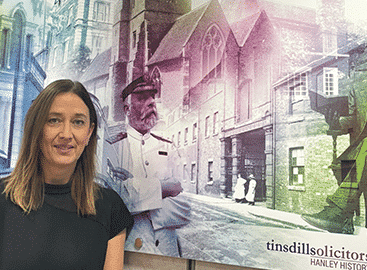Child Arrangements Order Solicitors
Our solicitors can support you with arrangements for children in many ways, including:
- Child arrangements orders
- Family mediation
- Collaborative law
- Financial arrangements for children
- Specific issue orders and prohibited steps orders
At Tinsdills, we understand that separation and divorce can be extremely tough to deal with, all the more so if you have children. It can be beneficial to make arrangements for your children as quickly as possible, allowing everyone involved to swiftly settle into a new routine.
Our specialist child arrangements order solicitors can support you to make the necessary preparations when going through a divorce, separation, or dissolving a civil partnership. Our team have expertise in various methods of alternative dispute resolution, including Collaborative Law, which can be useful to resolve any disagreements concerning your children.
Additionally, all of our team are members of Resolution, a network of family law professionals who are committed to promoting constructive approaches to family issues.
Please note we do not deal with Legal Aid enquiries for any Family Law work.
To arrange an initial appointment with one of our child arrangements order solicitors in Hanley, Leek, Newcastle-Under-Lyme, or Sandbach please call 01782 652300 or use the enquiry form on the right hand side of the page.
Our Child Arrangements Expertise
When going through a separation, many separating couples find it difficult to agree on their children’s living arrangements. If you are involved in a dispute about where your children will live, you will require the assistance of a family lawyer.
Your lawyer can assist you to make an application for a child arrangements order. These orders are used to decide:
- Where your children will live and when each parent will spend time with the children
- What type of contact there will be (for instance, visits or telephone calls)
At Tinsdills, we have much experience helping clients to apply for child arrangement orders. We will first learn about your concerns and situation so we can provide bespoke support that suits you best.
Where disputes arise regarding children’s living arrangements, it may be possible to resolve these disagreements using family mediation sessions. During mediation both parties are given the opportunity to voice their opinions and needs, attempting to agree on their children’s living arrangements with the guidance of an impartial mediator.
Mediation is often a prerequisite to Court, unless you are eligible for any exemptions, and our team will always attempt out of Court options first. We are able to settle the majority of cases without Court processes, however, our team can support clients through Court processes if necessary.
Collaborative Law is a method used to arrange legal matters and solve disputes. It is often used to support couples discuss matters following their separation, for example, finances and child arrangements.
As part of the process both parties will have a solicitor to represent them. The divorcing couple and their solicitors meet as a group of four, to negotiate divorce related matters, while accessing legal advice along the way.
To learn more about using Collaborative Law to organise your child law matters and financial needs please contact us at Tinsdills.
Where divorcing couples have children, they may need contact with the Child Maintenance Service, to arrange how their children’s living costs will be covered.
Child Maintenance is usually payed by the parent who does not live with the child, or who does not live with them for the majority of the time. Where child care is shared 50/50, neither parent is responsible for paying child maintenance to the other.
If you would like to find out how much child maintenance you are liable to pay, we can direct you to the online CMS calculator. Where there are concerns that you are paying the incorrect amount, you will need to make a referral to the CMS to resolve this.
Separated and divorced couples do not always agree on how their children should be raised, and at times disputes may arise. If parents cannot agree on certain issues themselves, and conflict escalates, legal intervention may be necessary.
Where parents are in dispute about specific issues related to their children’s wellbeing and or/ upbringing, our legal team can help clients to apply for a Specific Issue Order. These orders can be used to settle issues including:
- If a child’s name should be changed or not
- If a child should have certain vaccinations or medical treatment
- Deciding where a child should go to school
- Where one parent is seeking permission to take the child abroad
Where one parent is attempting to make a decision about a child’s upbringing, and the other parent disagrees, we can support the opposing parent to obtain a Prohibited Steps Order.
Meet Our Dedicated Child Arrangements Team
What Our Clients Say About Our Family Law Expertise
Our central goal is to satisfy our client’s needs. Here’s just a few of them, in their own words, detailing how we do exactly that.
“I have been going through a very messy divorce and Heather and Tinsdills have been my rock. Her advice has been invaluable and she has kept me from going in all gung ho in the divorce proceedings. I would highly recommend their services and I’m still using them for my ongoing issues.”
“I was really pleased with my solicitor Karen with all the help and support she gave me regarding my situation. Would highly recommend.”
Get in Touch With our Child Arrangements Order Solicitors
If you wish to discuss child arrangements, please get in touch with a member of our expert team today.
With a dedicated team on hand to take you through every step of the process, you can rest assured that we will provide you with the best chance of achieving the best possible outcome for you and your family.
Please note we do not deal with Legal Aid enquiries for any Family Law work.
To arrange an appointment with one of our child arrangements orders solicitors in Hanley, Leek, Newcastle-Under-Lyme or Sandbach, please call 01782 652300 or use the enquiry form on the right hand side of the page.
Child Arrangements FAQs
A Child Arrangement Order is an order from the Court which establishes a child’s living arrangements when their parents have divorced or separated. The order determines where the child will live, and how and when they will spend time with each of their parents, for instance, how often visits will occur and what communication will take place.
Anyone with parental responsibility for a child can apply for a child arrangement order, usually their mother and or father. If grandparents wish to apply, they must seek permission from the Court first.
While the term ‘child custody’ is no longer used in a legal sense, many clients still refer to this familiar term when discussing where their children will live after divorce.
When a couple separates, one parent does not automatically access the right to have their child live with them. The decision is made based on the child’s best interests and wellbeing.
Initially, parents should attempt to come to an amicable agreement between themselves, with the support of a solicitor. For example, by creating some form of shared care arrangement.
If parents are in dispute concerning child residency, they will need to attempt mediation to resolve this. Most cases can be solved out of Court, however, where this is not possible, individuals will need to apply to the Family Court to establish where their child will live.
The parent who does not live with the child makes child maintenance payments. If child care is split 50/50, neither parent is responsible for making payments to the other.
Child maintenance payments are calculated based on the paying parent’s income, whether they are paying for any other children, and to what extent child residency is shared between both parents.
Latest News
Visit the Tinsdills blog for great content about the legal sector and beyond.













